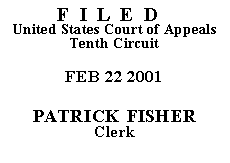

| LADONNA FAYE JUSTICE,
v.
NEVILLE O. MASSIE; THE
ATTORNEY GENERAL OF THE
STATE OF OKLAHOMA |
No. 00-5212
(D.C. No. 99-CV-311-H) |
The district court dismissed Justice's 28 U.S.C. § 2254 application for a writ of habeas corpus as time barred. See 28 U.S.C. § 2244(d). The court also denied petitioner's subsequent request for a COA concluding, after consideration of the record and Justice's arguments, that she failed to make a substantial showing of the denial of a constitutional right. See 28 U.S.C. § 2253(c).
Justice's petition for a writ of habeas corpus is governed by the provisions of the Antiterrorism and Effective Death Penalty Act of 1996, Pub. L. No. 104-132, 110 Stat. 1214 ("AEDPA"). Under AEDPA, "[a] 1-year period of limitation shall apply to an application for a writ of habeas corpus by a person in custody pursuant to the judgment of a State court." 28 U.S.C. § 2244(d)(1). The limitations period begins to run on the date when the judgment at issue "bec[omes] final by the conclusion of direct review or the expiration of the time for seeking such review." § 2244(d)(1)(A). The period is tolled during the time in which "properly filed" state post-conviction reviews are pending. § 2244(d)(2).
After a jury trial in Oklahoma state court, Justice was convicted of First-Degree Murder and sentenced to life imprisonment without parole. On October 22, 1996, her appeal to the Oklahoma Court of Criminal Appeals ("OCCA") was dismissed, and her conviction was affirmed. She did not seek a writ of certiorari with the United States Supreme Court; accordingly, the judgment against her became final for purposes of AEDPA 90 days later on about January 20, 1997. See Locke v. Saffle, No. 00-6210, -- F.3d --, 2001 WL 82285 (10th Cir. Jan. 31, 2001). Absent any tolling events, Justice was required to file her application for writ of habeas corpus within one year, i.e., by January 20, 1998.
Justice did not file for state post-conviction relief until June 29, 1998--a year and five months after the AEDPA limitations period began to run. Her petition is therefore time-barred unless she can demonstrate exceptional circumstances warranting equitable tolling of the limitations period. See Miller v. Marr, 141 F.3d 976, 978 (10th Cir. 1998).
In this Court, petitioner raises only one argument in support of her late filing. She asserts that "her time was stopped" by a motion for new trial filed in the OCCA on January 29, 1996, for which she allegedly has not received a ruling. The record, however, demonstrates that her new trial argument was disposed of in the OCCA's October 1996 opinion. Her new trial motion was based on the argument that her due process rights were violated when the state did not disclose that its witness McGowen traded testimony against her in exchange for lenient treatment in the charges pending against him. In its opinion affirming her conviction, the OCCA found that "nothing in this record . . . indicate[s] that McGowen was paid for his testimony or granted immunity from prosecution. . . . All of . . . [the relevant] information was available to the jury to be used in assessing his credibility." Justice v. Oklahoma, No. F-95-730, slip op. at *10 (Okla. Crim. App. Oct. 22, 1996).
Additionally, Justice has proceeded as if her direct appeals were completed and has never, prior to this appeal, raised the claim that her direct appeals were pending. She applied for state post-conviction relief and appealed the denial of that application to the OCCA. After the OCCA affirmed the denial of her request, she initiated these federal post-conviction proceedings. The availability of post-conviction proceedings is premised on the finality of the direct proceedings. See Walker v. Oklahoma, 933 P.2d 327, 330-31 & n.7 (Okla. Crim. App. 1997) ("[T]he post-conviction statutes have always provided applicants with only very limited grounds upon which to attack their 'final' judgments." (citing Teague v. Lane, 489 U.S. 288, 295 (1989), for the proposition that "final means a case where the judgment of conviction was rendered, the availability of appeal exhausted, and the time for petition for certiorari had elapsed" (internal quotations and citations omitted))). Given that the Oklahoma state courts entertained Justice's state post-conviction requests and that Oklahoma post-conviction proceedings only follow from "final" judgments, this Court does not now find that Justice's state direct proceedings survived such that they tolled the AEDPA limitations period.
Justice has not complied with the requirements of § 2244(d) and has raised no circumstances that justify equitable tolling of the limitations period. Accordingly, her application for a COA is DENIED, and her appeal is DISMISSED. See also Preston v. Gibson, 234 F.3d 1118, 1120-21 (10th Cir. 2000).
The mandate shall issue forthwith.
ENTERED FOR THE COURT
Carlos F. Lucero
Circuit Judge
*. The case is unanimously ordered submitted without oral argument pursuant to Fed. R. App. P. 34(a)(2) and 10th Cir. R. 34.1(G). This order and judgment is not binding precedent, except under the doctrines of law of the case, res judicata, and collateral estoppel. The Court generally disfavors the citation of orders and judgments; nevertheless, an order and judgment may be cited under the terms and conditions of 10th Cir. R. 36.3.